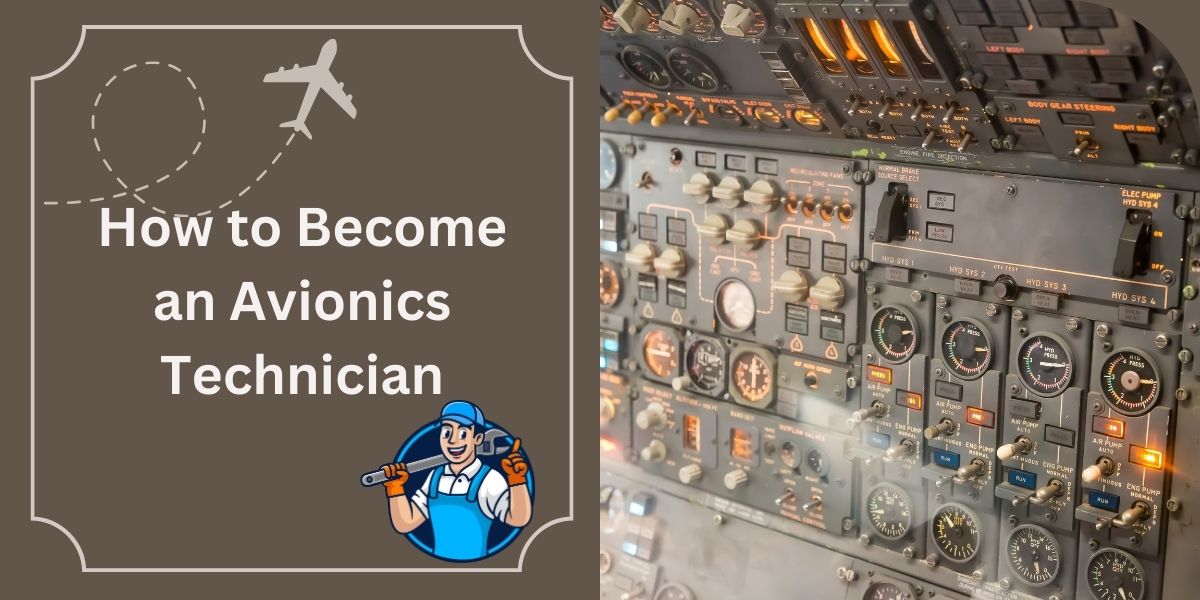Embarking on a journey to become an avionics technician is an exciting leap into the world of aviation technology. Avionics technicians are also called aviation electronics technicians. They repair, maintain, and inspect the electrical systems in aircraft with specialized knowledge and training.
Avionics technicians have important roles in the aircraft manufacturing field. If you are interested in electrical systems, the operation of aircraft, and advanced technologies, becoming an avionic technician could be a good career path for you.
In this article, we will discuss what an avionic technician is, how to become one, important skills, and salary.
What is an avionics technician?
An avionics technician is an aviation professional who works on an aircraft’s electrical system. They are responsible for all the electrical wiring and electronics, such as passenger entertainment, radios, and autopilot, on a plane.
Avionic technicians troubleshoot electrical issues on a plane and service any malfunctions. Their work is critical to the flight of an aircraft, so this can be an important and rewarding role.
What Does an Avionics Technician Do?
An avionic technician maintains different types of aircraft with the common goal of ensuring the plane, jet, or helicopter is in good condition to fly. Primary duties include:
- Perform scheduled maintenance and evaluation of aircraft
- Repair or replace electrical components
- Connect navigation instruments such as the altimeter, airspeed indicator, and vertical speed indicator
- Install computer and navigation software and electrical panels
- Diagnose malfunctioning equipment by reading flight data
- Test equipment and components for quality and function
- Record all service, repairs or replacements
- Follow federal regulations
How to Become an Avionics Technician
There are a few steps to set you on a path to becoming an avionics technician:
1. Earn a degree
While not required, having a degree can help you gain a competitive advantage while applying for jobs. Avionics technicians typically study avionics, aviation maintenance management, avionics technology, or computer science in aviation.
In any of these areas of study, you can learn more about how an aircraft operates, the systems that help it do so, and the components you may be responsible for repairing.
Many technicians earn an associate degree, but you can also pursue a bachelor’s degree if you’re interested in furthering your career in aircraft technology and maintenance.
2. Earn a certification from the Federal Aviation Administration (FAA)
Becoming certified by the Federal Aviation Administration permits you to work on aircraft. You can earn this certification by completing a program at an accredited institution. Training typically takes 18 months and amounts to about 1,900 hours of training.
Along with being certified, the FAA requires avionic technicians to be 18 years old and fluent in English. You also need to pass a written, verbal, and practical exam once you complete the program.
3. Choose a specialty
Three types of avionic technicians focus on different areas of aviation repairs and operation. Here are the specializations you can choose when becoming an avionics technician:
- System troubleshooter: This technician diagnoses complex problems and handles the smaller components of aircraft.
- Line technicians: These avionic technicians work on-site and inspect aircraft to diagnose simple electrical problems. They often run cables through planes for electrical systems as well.
- Bench technicians: This type of technician repairs faulty equipment or electrical components in a workshop and then returns the repaired parts to the site to be reinstalled.
4. Consider additional certifications
After gaining experience as an avionics technician, you may be eligible for certifications that can increase your salary and expand the job opportunities available.
ASTM’s National Center for Aerospace and Transportation Technologies offers four related certifications:
- Aircraft Electronics Technician
- Aerospace/Aircraft Assembly
- Foreign Object Elimination
- Unmanned Aircraft System Maintenance
To earn any of these certifications, you need to pass an exam. There are no additional requirements for these certifications, and they last a lifetime.
Skills to Become an Avionics Technician
To excel as an avionics technician, here are a few skills you can develop:
- Troubleshooting: Many avionics technicians spend most of their days determining various electrical issues and how to fix them. Troubleshooting skills can help them methodically test different components to find a solution.
- Attention to detail: Electrical systems can be complicated, with many devices and wires that need to operate perfectly. Avionics technicians need attention to detail to ensure they install each piece correctly.
- Installation: Avionics technicians need extensive installation knowledge to identify where each part should go and how to attach it to the rest of the system.
- Communication: To create reports and detail the work they complete, avionics technicians should have excellent written communication skills. Communication can also help them work with pilots who could describe the issues they experienced.
- Physical strength: Some installation and maintenance can involve moving or lifting heavy parts to reach the right area. Avionics technicians should be in good physical shape to perform their jobs.
- Science and mathematical skills: Avionics technicians need science and mathematical skills to interpret blueprints, check for the proper voltages, and install or repair circuits.
- Time management: Many avionics technicians operate on strict schedules to ensure they complete all of their repairs, inspections, or installations. Technicians who make repairs often need to complete their work for different aircraft that also operate on strict schedules.
- Dexterity: Electrical systems contain many components in small spaces, making dexterity an important skill to develop for avionics technicians.
How Much Does an Avionics Technician Make?
As of January 24, 2024, the average hourly pay for an aircraft avionics technician in the United States is $38.78 an hour and $80,655 per year.
While ZipRecruiter is seeing hourly wages as high as $61.06 and as low as $14.66, the majority of Aircraft Avionics Technician wages currently range between $26.68 (25th percentile) and $49.04 (75th percentile) across the United States.
The average pay range for an aircraft avionics technician varies greatly (by as much as $22.36), which suggests there may be many opportunities for advancement and increased pay based on skill level, location, and years of experience.
Conclusion
Avionics technicians have important roles in the aircraft manufacturing field. If you are interested in electrical systems, the operation of aircraft, and advanced technologies, becoming an avionic technician could be a good career path for you.
In order to pursue a career as an avionics technician, you must earn a certification in avionics. Networking within the aviation community, attending industry events, and seeking internships are excellent ways to get hired in the aviation industry.


 Jobi.ng
Jobi.ng









